- Home
- Tessa Gratton
The Queens of Innis Lear Page 9
The Queens of Innis Lear Read online
Page 9
Ullo touched her fingers to his lips and smiled. “I am rather overwhelmed at meeting you, and apologize for any misspeaking.”
She squeezed his fingers, and he released her. His eyes trailed down her neck and across her breasts with open intimacy. As her flesh went cold, she turned her face to Morimaros. “My father did bring a star priest with him. You wished your birth chart analyzed.”
“We are to be honored by your very own prophecies?” Ullo said, hand over his heart.
The king of Aremoria did not react but to flick his eyes at Ullo. Elia hid another smile, believing Morimaros had stronger feelings for Burgun than for her. That should make remaining detached easier.
It was Lear who said, one arm about his Fool, the other waving at the retainers, “Here are the charts, if my dearest daughter obliges, and perhaps in your stars she’ll find some preference for her favors.”
“I would petition the jewels of heaven to tilt in their courses toward me,” Ullo said prettily.
Elia wished Morimaros would say, I need rely on no such petitioning, or some such, that might put the king of Burgun down, but Morimaros was silent.
She gestured for the charts to be placed upon the well’s tabletop and glanced between the two kings. “I must begin with knowing your times of birth, so we might choose the correct charts.”
Morimaros paused in consideration.
“Do you know it?” she prompted gently.
“I do, lady,” he said just as gently. “I only would not want to remove from Ullo the chance to be first.”
“Sporting of you,” Ullo snapped. “Perhaps there is some star sign now which of us should be preferred.”
Casting her gaze up at the blue sky, Elia said, “I’m afraid the afternoon stars have no signs for us, influencing instead beyond our means to see.”
“Perhaps a worm sign, then?”
She looked sharply to the speaker: it had been Morimaros.
“Do you listen to the language of trees?” the king of Aremoria continued. He held his expression as cool as ever, but Elia warmed at the question.
“Worm signs!” Lear cried, scrubbing the air with his arms. “None such in my court.”
Elia’s pulse jumped, and she forced her pleasure hard away. “Of course not, Father,” she soothed.
Ullo frowned sympathetically. “Only the purest prophecy for such as ourselves.”
“Indeed,” Lear said. “I will be the star of this afternoon and say Ullo will have his reading first.”
Elia glanced at Morimaros with slight apology, wishing she might say something to him, but in the end these kings mattered little to her.
Ullo was twenty-four years old, born under the Violet Moon of the Year of Past Shadows. Elia paged through the proper charts while Ullo leaned over her shoulder, smiling prettily in the corner of her eye, but not pressing near enough to touch or overwhelm her. He smelled of properly burnt sugar and a current of sweat, but not unpleasantly so.
The Year of Past Shadows had been full of repeating patterns in the dawn clouds, tied back to the year before, and thus given its name. Elia kept that in mind as she carefully marked a blank sky map with stars from the night of Ullo’s birth, counting everything forward, wishing she knew the clouds and very worm signs Morimaros had asked after. Or had a handful of holy bones to cast. But her father did not allow bones, or any such earthly predictions, in his records. Unlike bones and earth, Lear said, the stars see all, from their greater vantage point, and are not marred by subjectivity.
The king of Burgun’s birth star was the Rabbit’s Heart, rising under a crescent moon to inflict sharpness on an otherwise generous spirit. Perhaps the sharpness of a crown, she assured him, so long as he did not allow it to make him bitter.
“With so sweet a lady as you beside me, bitterness would be impossible,” he replied.
Elia demurred, but her father laughed approvingly, and the Fool pointed out that some bittersweet flavors remained longest in memory.
Morimaros of Aremoria would turn thirty in just over a month, several days before this year’s equinox. “But it was the equinox itself the night I was born,” he offered.
“Ah,” King Lear intoned excitedly, putting a sour tilt to Ullo of Burgun’s smile.
“That is helpful,” Elia said, repeating her charge of marking down stars and counting forward as she’d done first for Ullo. The Aremore king had been born in the Year of the Sixth Birds, and on that autumnal equinox, an hour before dawn in Aremoria, it was the Lion of War that crowned the sky. Elia glanced at her father, whose eyes narrowed on the chart. “That constellation holds your counter star, Elia,” he said testily.
“It is, my lord,” she agreed. “The Lion of War, rampant and constant as Calpurlugh, but instead of a stationary constant, it circles the same piece of sky, protecting or confining.”
Morimaros cleared his throat. He had not moved nearer to her for his reading, but maintained his stance at the fore of his retainers, shoulders back and hands folded behind him. “Is Calpurlugh not the Eye of the Lion? It has been years since my astronomy lessons, but I thought they were pieces of each other.”
“Pieces that never see one another, yes,” Elia said. “They are not in sequence together, but only one or the other. Depending on the stars around them, it is either Calpurlugh or the Lion that shines, never both.”
“Alas,” Ullo of Burgun said.
“But the Lion is bold, and on an equinox dawn as this is, he is isolated but surrounded by … possibility.” Elia felt an unusual urge to couch her reading, for this was a lonely one, and she could imagine it heartbreaking for a man already isolated within a crown. It was not a future she would choose for herself.
Morimaros did not seem affected, though, or particularly invested in the reading. His blue eyes remained calm, and he showed neither disappointment nor pleasure, as if none of this mattered at all.
Irritated to feel she’d wasted her time, when he had requested this reading in his letter—had it been his only way of flirtation? Appealing to her interest though he shared it not at all?—Elia straightened. “I am weary, sirs,” she said, “and my companion must have arrived by now. I must see her and rest after my travel down from the north.”
Immediately, Morimaros bowed, accepting her withdrawal.
The Fool clapped his hands. “I would go with you, to see Aefa.”
“Please,” Elia said.
Lear put a hand on Ullo’s shoulder, but said to both kings, “You will see my Elia again at tomorrow’s Zenith Court, where all I have promised will be decided.”
The king of Aremoria said, “I hope I may speak with you, Lear, further?”
Truly, Elia thought as she kissed her father’s cheek, it was her father that Morimaros had come to treat with, not her. He obviously wished alliance and dowry; not a queen, not herself.
Ullo offered his hand, and she took it, glad he at least bothered to pay her personal attention, even if his eyes lingered too long on her neck, on her wrists and the line from breast to waist. Tomorrow she would be rid of both these kings.
The king of Burgun escorted her out of the courtyard, the Fool following behind with a weird, affected gate. When they emerged into the inner yard, Elia angled toward the family keep. “Thank you,” she said.
“I hope we can continue our courtship, even beyond tomorrow.”
“I have … enjoyed your letters,” she acknowledged, thinking of Aefa’s recitations.
Drawing her nearer, Ullo said, “I would rather your good opinion than your father’s. Aremoria may be a great commander, but I rule from the heart, and I want only what is best for my people. I think you are it, and beautiful.”
Though uncomfortable at the touch of his hip to hers, Elia appreciated the honesty. “I will not favor Aremoria over Burgun based on these stars.”
His smile was radiant.
The Fool’s face appeared between hers and Ullo’s. He smiled madly, showing all his teeth. “I was born under a grinning moon, see?”
“I do,” Ullo said, laughing as though charmed. He took the hint, and stepped back from Elia, bowing over her hand. “Until tomorrow, princess.”
The king of Burgun and his maroon retinue passed beyond her, marching at a leisurely pace toward the guest tower. Elia wondered at the wisdom or folly of putting both kings in the same place. They clearly did not get on, and they had been at war for two consecutive summers. Had it been her father’s decision, and had he done so with a mischievous mind? Or merely at the suggestion of the stars?
“I think you would make a great queen,” the Fool said, touching her hair. She suspected he’d found one of the crystals pinned with the silver web. Elia turned her head. The Fool’s eyes were so like Aefa’s, though the white lids drooped heavier with age despite his being nearly two decades younger than Lear. She smelled spiced meat on his breath, and the earthy fresh henna in his hair.
Elia put her fingers on his red-stained bottom lip. She did not want to be any queen, nor did she feel suited to the job. “Hush, before the stars hear.”
“The vault of heaven does not listen to fools,” he said brightly, and danced her across the yard.
FIVE YEARS AGO, ASTORA
THE STAR CHAPEL of Astora was built into the surrounding mountains, formed of heavy limestone and plaster, painted generations ago with gold flake and indigo to make the first chamber like the vault of heaven. Regan Lear passed through it, unconcerned with the public sanctuary. Heads turned as star-kissed priests and the prayerful noted the middle daughter of their king gliding through sharp and smooth as a galley in calm waters. Not since her elder sister’s wedding to their duke two years ago had Regan come into this chapel, but she was immediately recognizable. Against the martial Gaela Astore, who covered herself most days in armor and the raiment of men, it was perhaps a surprise to gaze upon such a sleek, feminine princess. Regan’s gown was voluminous and pale as the sky at dawn, dragging behind her in a perfect half-circle of oystered layers. She wore a veil of thin silver chains woven through her curls, and looped beneath her chin from delicate brooches at her temples. A dripping crown of rain.
And most startling of all, this princess smiled.
Today was the first day Regan had been truly happy since her mother died.
She reached the arched doorway leading to the Chapel of the Navel and heaved it open. The staircase was narrow and cold, and instantly she was assaulted by the damp air blowing down from the chapel above. This was the oldest chamber in the church, carved high into the side of the mountain long before any dukedoms, when the island welcomed people into its bleeding heart.
Regan lit no candles from the small storage alcoves. In violet darkness, she steadily ascended. Her thin-soled slippers tip-tapped against the stone, echoing forward like a gentle warning. She paused to toe them off at the top of the stairs, proceeding forward in bare feet. The passage was not long, but it narrowed in the center before widening again, like a birthing canal. Or that was how Regan imagined it, her smile brightening.
The Navel itself was merely a stone rectangle cut into the mountain, with a ledge carved along the walls for sitting. The entrance through which Regan had arrived looked directly across the twenty-foot length and through two narrow stone columns, outside into the dark valley below. Astora City was a warm glow, and beyond, velvet hills lifted gently away, before the stretch of purple sky.
A six-pointed star had been carved through the roof, allowing moonlight and starlight to shine dimly in. It was not the proper time of year or night to serve its greatest function, at the apex of the Longest Night Moon.
Regan moved directly below the skylight, where the slate floor had cracked with age, and knelt beside the only adornment: a stone water basin carved beside a deep, narrow well. The well was covered with a wooden lid, so Regan shoved it aside. She dipped her fingers into the stale, tired water, ruining the dull reflection of the night sky, and touched the wet blessing to her cheeks, her lips, and then the linen over her belly. Her hand remained there, cupping the only star Regan cared for: the new pinprick of light in the deep recess of her body.
She bowed her head, a smile continuing to play at her lips, and thought of the life in her, the dynamic, dangerous spark. Her breath was low and long, deep and content. Not a feeling Regan was accustomed to, being a woman of sharp, fierce ambition. She rarely experienced anything like peace in her heart. Satisfaction, however, was a thing she’d recently come to know quite intimately, and she was pleased to discover how the one could lead to the other.
The stars grew bolder as she waited, and color fled the sky until it was black as black could be.
Regan imagined the moments approaching again and again: her stern sister’s mouth falling open in surprise; their embrace; the tense, rough argument, followed by renewed dedication to each other. It was a thrill to anticipate the special, unique pleasure of being of one mind with Gaela, the most ferocious, the great pillar of her heart.
Of course she heard her sister approach.
A clatter and grunt, the oddly gentle ringing of metal, like a song.
Regan straightened her shoulders, held her penitent pose.
Behind her, Gaela burst into the room with a quiet curse.
“Sister,” Gaela said harshly. Not from anger or irritation, but for herself. Gaela wielded her words and movements like armor and war hammers. Regan preferred her own thorns to be small and precise and subtle, though no less deadly.
Settling back onto her heels, Regan sang out in the language of trees. Sister! One of the only such words Gaela understood.
Gaela Astore fumed out of the shadows, stomped to Regan’s side, and fell hard to her knees. She wore leather and wool, an empty sword belt and a skirt of mail. Her hair was twisted back like the roots of an oak, pulling her forehead wide. She was a beauty, despite herself, Regan had always thought: a slice of moon, magnificent and dangerous.
“This should be filled in,” Gaela said, gesturing at the old well. “Why did you wish to meet here? After all these months.”
Regan waited, patient with Gaela as with no other.
Gaela’s eyes roamed her sister’s face and body, coming to rest on the hand still curled at Regan’s belly. “Yes,” Gaela whispered. And her mouth broadened into a toothy smile.
Regan grasped Gaela’s hand and flattened it against her belly, pressing their hands together there. “The future queen.”
“Or king,” Gaela answered, fisting her hand in the layers of Regan’s skirt, and dragged her sister toward her. They embraced. For so many years this had been a piece of their goal: Gaela on the throne of Innis Lear, with Regan’s children for her heirs. Gaela had been sixteen when she swore to her sister, fast and secretly, that no child would lock into her womb, she would make sure of it. We will be king and queen of Lear, iron-strong Gaela had promised her willow-thin fourteen-year-old sister. No matter husbands or rivals, it will be you and me, our bodies and our blood. Regan had kissed her cheek and promised.
Regan kissed her again now, and touched their cheeks together. She braced for the next step.
The lady-warrior took Regan’s shoulders in demanding hands and said, “How long?”
“I only was certain five days ago, and so it will come in the earliest weeks of spring. You are the first to know.”
“You must marry, and fast.”
“We’ll say we eloped already, and everyone will believe it.”
Gaela’s brows lifted. “Of the neat, passionless Regan Lear? I have my doubts.”
“But, sister”—Regan’s lips pressed a secretive smile—“they will believe it of me with this man. That we were forced to hide our passion from the king.”
“Who is the father?” Gaela growled.
This sparked a brilliant fire in Regan’s eyes: shards of brown and tan and a blue just like their father’s, tossed together in a tempest that seemed a gentle brown when beheld from the distance most gave between themselves and the sly middle daughter. Only a handful of people stood close
enough to know Regan had slices of her father inside her eyes. “Lear will be so furious, Gaela,” she whispered, glee and cruelty warring in the thin tone. “And Astore, too. It is the worst and the best I could do.”
Understanding passed swiftly to Gaela. “Oh, Regan, my love, you did not.”
“Connley, Connley, Connley,” Regan said, differently each time. First casual, then wicked, then deep in her mouth, as if she could taste him buried there.
Gaela thrust herself to her feet. “His grandfather despised our mother! His mother sought for years to marry our father! You give Connley the hope of the crown now?”
“His children only.” Regan slid to stand as well. “And a knife in our father’s heart.”
“So, too, it will divide us, all the more because my husband and your lover are chiefest of rivals.”
“It is done.”
“You should have discussed it with me!”
“You did not ask my advice when you chose Astore!”
“Ah! But Astore was the obvious, only choice! He is fierce and, by our father’s and other men’s reckoning, worthy of the crown. The anticipated alternate, should the line of Lear fall, because of his proven strength and his blasted stars. I chose him to play the part I want him to play. He thinks already to have a crown from me. Connley will not rest with that. Does he fear you? I will not believe if you say he does.”
Regan touched her tongue to her bottom lip, uncontrolled before her sister as she was before no other. “He does not fear me, no, nor I him. But Connley feels a more possessive thing for me, one that will not drive him away as fear or pity or sorrow might drive yours.”
“Surely you do not speak of love,” Gaela scoffed. “Love is no strength.”
“Not even between us?”
Gaela scoffed. “This is not love between us, we are one. We are beyond love!”
“Are we?” Regan touched her sister’s earlobe, tugged gently. She knew Gaela had a heart of iron in her chest and cared only slightly for anything she did not feel in her very bones. Worse yet was Gaela at expressing emotions that were not the fiery sort, were not those powerful feelings allowed to great warriors and kings; she disdained all things considered womanly as she disdained her own womb. Regan could not remember if Gaela had been born so, or learned it from their father, his stars, and Dalat’s death. All Regan knew was that her sister had the stars of conquerors in her sky, and such men did not love well. Gaela thought she was beyond love’s reach, while Regan believed herself to be composed of nothing but love. Terrible, devastating, insatiable love.

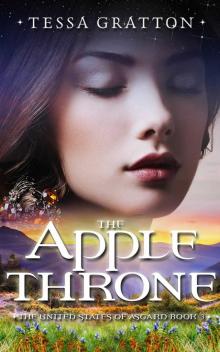 The Apple Throne
The Apple Throne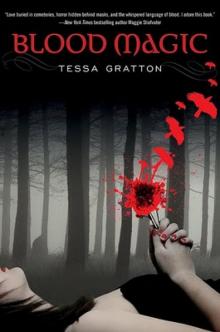 Blood Magic
Blood Magic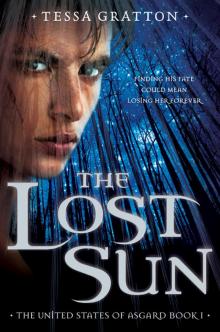 The Lost Sun
The Lost Sun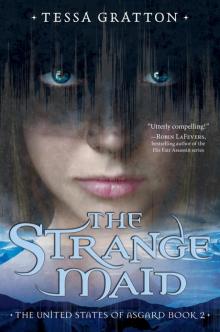 The Strange Maid
The Strange Maid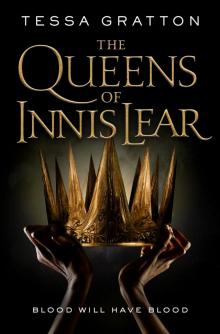 The Queens of Innis Lear
The Queens of Innis Lear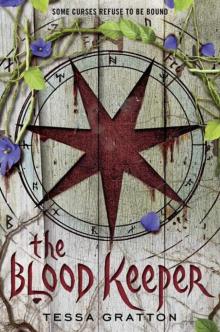 The Blood Keeper
The Blood Keeper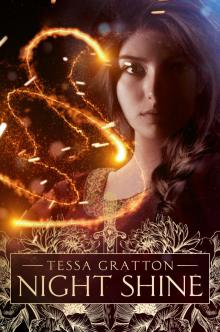 Night Shine
Night Shine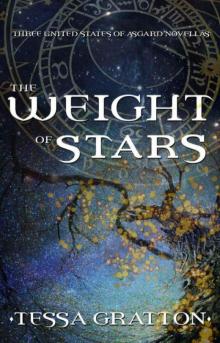 The Weight of Stars
The Weight of Stars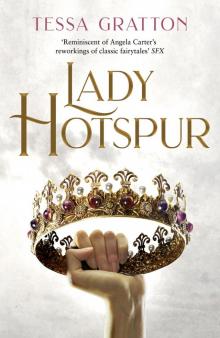 Lady Hotspur
Lady Hotspur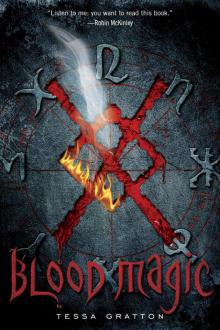 Blood Magic (The Blood Journals)
Blood Magic (The Blood Journals)